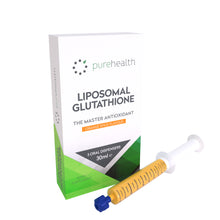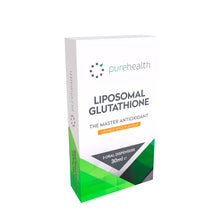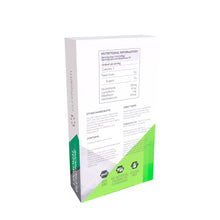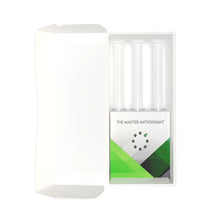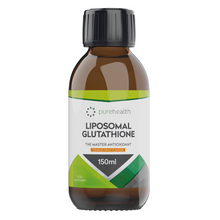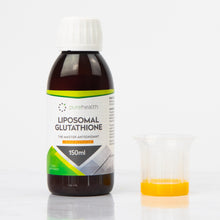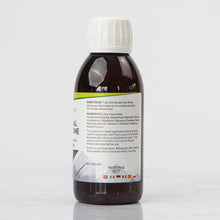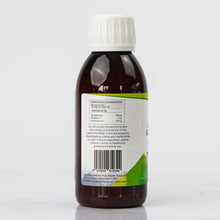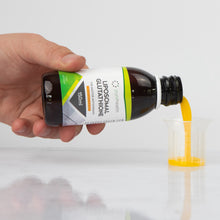The Master Antioxidant in Purest Form
That’s why we offer (and use ourselves) the most bioavailable glutathione you can get anywhere today.
One of the biggest challenges was finding a way to help your body absorb as much glutathione as possible. The solution: a patented liposomal delivery system that protects the glutathione from obstacles on its journey, such as stomach acid. This is a problem a lot of other glutathione supplements aren’t able to conquer, including some liposomal products in different formats - such as capsules.
(In other words, the liposomes are “bubbles” that encapsulate the glutathione to keep it safe until it reaches the intestine, so you absorb all of it for the greatest benefit).


What is Glutathione?
Regardless of your age and health, your body has to cope with the ever-present threat of “free radicals”. The substances that generate these, such as toxins, pollutants and other junk, can cause all sorts of problems, from disease to premature aging.
Antioxidants clean up those free radicals that hurt your tissue and cells. But not all antioxidants are created equal. While it’s a protein made up of the amino acids glycine, cysteine and glutamine, glutathione is called the “master antioxidant” as it’s super-potent and efficiently used by your body to flush out pollutants and other damaging elements.
You’ll most often find glutathione hanging out in the liver, where it plays a major part in flushing toxins out of your body. It’s also active in organs like the brain, kidneys, liver, heart and lungs.

What is “Liposomal” Glutathione?
In typical tablet or capsule form, Glutathione is about as useful as a chocolate teapot.
When the tablet or capsule hits your stomach, the glutathione gets broken down into the three amino acids it comes from. It almost never reaches the intestine intact, where it needs to get to in order to work its magic. Until recently, the only way we could get a concentrated dose was through intravenous delivery: expensive, time-consuming and impractical.
That’s why we use liposomal glutathione. A liposome is a microscopic “bubble courier” that can safely pass through our digestive system to deliver whatever’s inside it. The glutathione snugly sits in the liposome until it reaches the intestine, where it then gets fully absorbed and goes to work cleaning up free radicals and detoxing our bodies.
You’ll find glutathione in two main places.
1. Your own body. The good news is your body makes its own glutathione. The bad news: modern day lives of poor diet, pollution, medications, stress, trauma, aging, disease and even infection all take a big hit on your built-in supply.
2. The foods you eat. Some foods contain glutathione, and others have the building blocks (cysteine, glycine and glutamine) for your body to make more. You’ll find foods like fruits, vegetables, eggs and turmeric are all rich in those amino acids your body uses to create glutathione.
But here’s the catch. Most of us don’t eat anywhere near enough of these foods to get the glutathione to keep our bodies fighting fit and free of damaging toxins. That’s why we often need supplements.
It’s tricky to tell, as symptoms can vary from person to person. Most commonly, if you’re feeling run down and your immune system isn’t firing on all cylinders, glutathione deficiency could be playing a part. So, if you’re coughing, spluttering and suffering from infections more than usual, you may find regular doses of glutathione make a difference to warding off these bouts of “down and out”.
(As a double whammy, your body burns through glutathione when fighting sickness and infection. If you’re falling ill frequently, glutathione may help you break that sickly pattern.)
Like most supplements, the answer is: “it depends”.
If you’re battling sickness or are on medications, you might get benefit from taking it every day. Glutathione helps build a resilient immune system, and in times of stress keeps it ticking along so it’s not as vulnerable to insidious infections or bacterial flare-ups.
Outside of illness, other factors can also cause your body to burn through glutathione in double time:
- Stress and burnout
- Heavy, exhausting travel (and the resulting jet lag)
- Over exposure to a toxic environment
- A few too many drinks
So, whether you’re run down with illness or suffering “side effects” from our modern lifestyles, glutathione is the perfect way to keep your immune system in tip-top shape.
We’d love to say yes, but… for all the amazing benefits of glutathione, its one drawback in most products is the flavour.
Except when it comes to Pure Health Liposomal Glutathione.
As fitness and health buffs, even we’re not keen on gulping some of the gag-inducing glutathione you find on the market. That’s why taste was a top priority for us. With “Orange Spice”, a citrus tang made from natural flavourings, you get a taste that makes the usual unpleasantness and sulphur-like smell of other oral glutathione supplements a bad memory.
6 Reasons Your Body’s Crying Out for Glutathione
Protects Your Insides
In today’s modern world, your body’s under extreme oxidative stress. Toxic “rubbish” like heavy metals, insecticides & herbicides, fuel exhaust pollution, cigarette smoke and more take a toll on your cells and organs. Glutathione acts as a “first layer” of defence against these toxins, and eases the burden on your body trying to flush them out safely¹.


Cleans You Out (In a Good Way)
In the fight against free radicals, your body does what it can to metabolically detoxify itself. However, Glutathione kicks things up a notch in the detox department², being an important part of the process that flushes free radicals and their friends out of your liver to be excreted by your intestines, kidneys and skin.
An Anti-Aging Elixir
Aging isn’t fun for anyone, but with glutathione you may be able to slow the clock down. One study³ noted participants supplementing with glutathione enjoyed a big reduction in wrinkles, while also noticing a renewed “spring” in their skin elasticity.


Strengthens Your Immune System
Ever notice how some people never seem to get sick? Maybe it’s because their bodies are well-stocked with glutathione, which has been clinically proven to boost almost every part of your immune system⁴. And if you’re already under the weather, popping glutathione has been shown to help fight off viruses and bacteria⁵.
Healthy Liver, Healthy Life
Sure, you know glutathione helps detox the liver. But it does a lot more for your liver than that. Glutathione can actually improve liver function, is sometimes used to treat acute poisoning and has been shown to have therapeutic effects when combating liver disease⁷.


Keeps Inflammation In Its Box
It’s rarely mentioned, but glutathione also plays a part in controlling inflammation⁶. However, in fighting inflammation (and the host of side-effects that come with it), your body depletes its reservoir of glutathione faster. This means you’ll have to restore your glutathione levels regularly to make sure inflammation stays in its box.
References
1. Pastore, A. et al., 2003, Analysis of glutathione: implication in redox and detoxification. https://www.ncbi.nlm.nih.gov/pubmed/12809732
2. Ketterer, B. et al., 1983, The role of glutathione in detoxication.https://www.ncbi.nlm.nih.gov/pmc/articles/PMC1569131/?page=5
3. Weschawalit, S. et al., 2017, Glutathione and its anti-aging and anti-melanogenic effects. https://www.ncbi.nlm.nih.gov/pmc/articles/PMC5413479/
4. Dröge W, & Breitkreutz R., 2000, Glutathione and immune function. https://www.ncbi.nlm.nih.gov/pubmed/11115795
5. Allen, M et al., 2015, Mechanisms of Control of Mycobacterium tuberculosis by NK Cells: Role of Glutathione.https://www.ncbi.nlm.nih.gov/pubmed/26500648
6. Honda, Y. et al., 2017, Efficacy of glutathione for the treatment of nonalcoholic fatty liver disease: an open-label, single-arm, multicenter, pilot study.https://www.ncbi.nlm.nih.gov/pmc/articles/PMC5549431/
7. Morris, G. et al., 2014, The glutathione system: a new drug target in neuroimmune disorders. https://www.ncbi.nlm.nih.gov/pubmed/24752591




